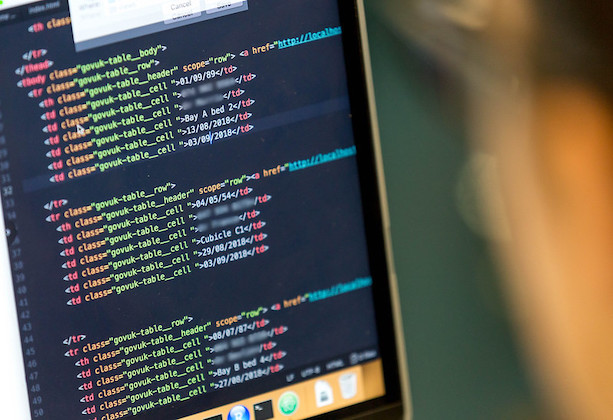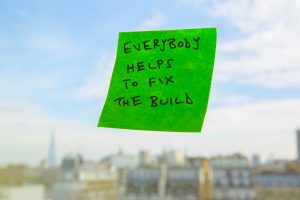
I joined the Government Digital Service (GDS) as a frontend developer in January 2020 after many years working in the private sector. I’ve always wanted to work somewhere where I can make a difference and since joining GDS, I feel like I have done that.
As we wrote recently, frontend developers play a crucial role across many parts of GDS, directly affecting the parts of government people interact with most often.
Providing systems that people depend on
The services we work on in the public sector are essential. Users have no alternative but to use services such as ‘Apply Online for a Passport’ or ‘Apply for or renew a Blue Badge’.
These services are essential for people so they can get on with their lives. Some of these systems are used by millions of people, which presents many interesting challenges. For example, the frontend team needs to make sure GOV.UK runs as quickly as possible, on whatever device the user has.
The COVID-19 pandemic is another example of this. As use of GOV.UK skyrocketed during this time, we had to make sure that everything was able to handle this extra load.
I want to highlight a few things that make working as a frontend developer at GDS so special and inspiring.
Accessibility
Accessibility is a big focus in the public sector. There is a legal requirement for all public sector services to meet WCAG 2.1 AA rating. This means frontend developers need to be accessibility experts and champion accessibility to the rest of the team.
To help us do that, GDS has a dedicated accessibility empathy lab. This helps frontend developers to understand how users with disabilities use and interact with our services to build better services. We also carry out external audits to assess the accessibility of our services.
I’ve never experienced this focus on accessibility from any other organisation I’ve worked at.
I feel proud that everything we create is available to users with a whole range of accessibility needs.
User research
We also spend a lot of time on user research. We carry out research and test prototypes before we spend time building something. We want to make sure we are building the right thing - not something that users don’t need.
Also, once we’ve delivered something, we continue to gather research to see how we can continue to improve the service.
I’ve attended many user testing sessions with live users. Everyone at GDS is encouraged to attend user research sessions to gain a better understanding of the issues users face.
They can include:
- testing prototypes and getting feedback from users
- evaluating how our applications work with users that use different types of accessibility technologies
- visiting users' homes and seeing how differently they interact with our service when they’re in the comfort of their own home
Every time I’m surprised by how our users interact with our services and do things that we did not expect. We can use this feedback to make changes to not only the frontend but the service as a whole.
Communities
GDS encourages people to build communities. There are GDS and cross-government communities for frontend, accessibility, technical writing, design and so much more. It’s a great way to meet people and learn new things. The cross-government frontend community is really active on Slack and is a great way of keeping in touch with frontend devs in other parts of government and sharing knowledge with them. These channels are open to public sector employees only.
Many of the services we build at GDS are used by other government departments, local government and arm’s length bodies. For example, I currently work for GOV.UK Pay, which is used by the NHS, DVLA, the Passport Office, local councils and many more.
We get lots of good feedback from the rest of the government, which we use to improve our services.
Working in the open
We work in the open. That means we publish the source code for all our services. This means we can share ideas and be transparent, meeting the Government Design Principle: “Make things open, it makes them better”. Ultimately this helps us to build better services.
Other public sector departments which integrate with our services can see exactly what we did and comment on our code.
Support
The service I work on provides 24/7 support. As our services are essential, we need to make sure systems are always operational. We also respond to support questions from users all across government. We always look at ways to improve the support that we provide and the insight we get from user requests helps us do this.
Stretching beyond frontend development
GDS is an exciting place to work for a frontend developer. You have the opportunity to work on services that make a big difference to people’s lives and are used by millions of people. Being frontend developers, the work we do means services on GOV.UK are fast, accessible and reliable.
What makes being a frontend developer here exciting too is that our role often stretches beyond what most people would consider as frontend development. It's not all about the frontend code: as an integrated member of the agile team, there are many opportunities to focus on work that improves a user’s experience.
If you’re interested in working at GDS as a frontend developer, head over to our Careers Page to see the latest openings. Public sector workers can also join the cross-government frontend Slack community and read more about the community on our Service Manual page.
